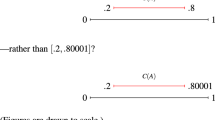Abstract
We argue, in the spirit of some of Jean-Yves Jaffray’s work, that explicitly incorporating the information, however imprecise, available to the decision maker is relevant, feasible, and fruitful. In particular, we show that it can lead us to know whether the decision maker has wrong beliefs and whether it matters or not, that it makes it possible to better model and analyze how the decision maker takes into account new information, even when this information is not an event and finally that it is crucial when attempting to identify and measure the decision maker’s attitude toward imprecise information.
Similar content being viewed by others
References
Ahn D. S. (2008) Ambiguity without a state-space. Review of Economic Studies 75(1): 3–28
Ahn, D., Choi, S., Gale, D., & Kariv, S. (2008). Estimating ambiguity aversion in a portfolio choice experiment. Tech. rept. UC Berkeley.
Akerlof G. A., Dickens W. T. (1982) The economic consequences of cognitive dissonance. The American Economic Review 72(3): 307–319
Anderson, E., Hansen, L., & Sargent, T. (1999). Robustness, detection and the price of risk. University of Chicago.
Arrow K., Hurwicz L. (1972) An optimality criterion for decision-making under ignorance. In: Carter C. F., Ford J. L. (eds) Uncertainty and expectations in economics. Basil Blackwell & Mott Ltd, Oxford, England
Brunnermeier M. K., Parker J. A. (2005) Optimal expectations. The American Economic Review 95(4): 1092–1118
Diaconis P., Freedman D. (1986) On the consistency of Bayes estimates. The Annals of Statistics 14(1): 1–26
Ellsberg D. (1961) Risk, ambiguity, and the Savage axioms. Quartely Journal of Economics 75: 643–669
Feldman M. (1991) On the generic nonconvergence of Bayesian actions and beliefs. Economic Theory 1(4): 301–321
Gajdos T., Hayashi T., Tallon J.-M., Vergnaud J.-C. (2008) Attitude toward imprecise information. Journal of Economic Theory 140(1): 23–56
Gajdos T., Tallon J.-M., Vergnaud J.-C. (2004) Decision making with imprecise probabilistic information. Journal of Mathematical Economics 40(6): 647–681
Ghirardato P., Maccheroni F., Marinacci M. (2004) Differentiating ambiguity and ambiguity attitude. Journal of Economic Theory 118(2): 133–173
Gilboa, I. (Forth.) Questions in decision theory. Annual Review in Economics.
Gilboa, I., Maccheroni, F., Marinacci, M., & Schmeidler, D. (Forth.a). Objective and subjective rationality in a multiple prior model. Econometrica.
Gilboa I., Postlewaite A. W., Schmeidler D. (2008) Probability and uncertainty in economic modeling. Journal of Economic Perspectives 22(3): 173–188
Gilboa I., Postlewaite A., Schmeidler D. (2009) Is it always rational to satisfy Savage’s axioms?. Economics and Philosophy 25(3): 285–296
Gilboa, I., Postlewaite, A., & Schmeidler, D. (Forth.b). Rationality of belief. Or why Bayesianism is neither necessary nor sufficient for rationality. Synthese.
Gilboa I., Schmeidler D. (1989) Maxmin expected utility with a non-unique prior. Journal of Mathematical Economics 18: 141–153
Giraud, R. (2009). Objective imprecise probabilistic information, second order beliefs and ambiguity aversion: An axiomatization. mimeo.
Gollier, C. (2005). Optimal illusions and decisions under risk. IDEI Working Papers.
Halevy Y. (2007) Ellsberg revisited: An experimental study. Econometrica 75(2): 503–536
Jaffray J.-Y. (1989) Généralisation du critère de l’utilité à l’incertain régulier. Operations Research/Recherche Opérationnelle 23(3): 237–267
Kopylov, I. (2006). A parametric model of ambiguity hedging. University of California at Irvine.
Nehring, K. (2007). Bernouilli without Bayes: A theory of utility-sophistiicated preferences under ambiguity. Mimeo, University of California, Davis.
Nehring K. (2009) Imprecise probabilistic beliefs as a context for decision-making under ambiguity. Journal of Economic Theory 144(3): 1054–1091
Olszewski W. (2007) Preferences over sets of lotteries. Review of Economic Studies 74(04): 567–595
Rébillé Y. (2006) Decision making over necessity measures through the Choquet integral criterion. Fuzzy Sets and Systems 157(23): 3025–3039
Stinchcombe, M. (2003). Choice and games with ambiguity as sets of probabilities. mimeo, University of Texas, Austin.
Tapking J. (2004) Axioms for preferences revealing subjective uncertainty and uncertainty aversion. Journal of Mathematical Economics 40: 771–797
Wang, T. (2001, revised 2003). A class of multi-priors preferences. University of British Columbia.
Author information
Authors and Affiliations
Corresponding author
Rights and permissions
About this article
Cite this article
Giraud, R., Tallon, JM. Are beliefs a matter of taste? A case for objective imprecise information. Theory Decis 71, 23–31 (2011). https://doi.org/10.1007/s11238-010-9197-4
Published:
Issue Date:
DOI: https://doi.org/10.1007/s11238-010-9197-4




